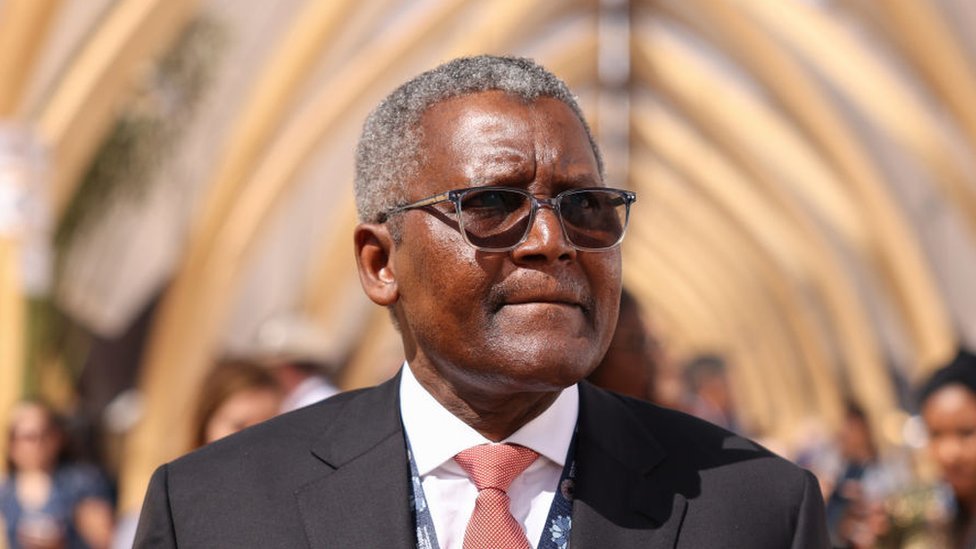Africa’s richest man and President of Dangote Industries Limited, Aliko Dangote, has raised the alarm over the continent’s growing dependence on imported substandard fuel, warning that Africa is losing an estimated $90 billion annually to refined petroleum products it can produce locally.
Speaking at the ongoing West African Refined Fuel Conference in Abuja on Tuesday, Dangote condemned the influx of cheap, often toxic petroleum products into African markets and criticised the fragmented fuel standards that hinder regional trade.
“Africa is increasingly becoming a dumping ground for petroleum products that wouldn’t pass quality standards in Europe or North America,” Dangote stated.
“This isn’t just an economic problem. It’s a health and environmental crisis.”
He revealed that Africa imports over 120 million tonnes of refined products every year due to limited refining capacity, despite producing about seven million barrels of crude oil daily.
He added that only about 40 per cent of the continent’s 4.3 million barrels-per-day consumption is refined locally—compared to over 95 per cent in Europe and Asia.
“This means we are exporting jobs and importing poverty,” Dangote said. “It’s a $90 billion opportunity lost. To put this in context, only about 15 percent of African countries have a GDP higher than that.”
While thanking the Nigerian National Petroleum Company Limited (NNPC) for making Nigerian crude available since the launch of the Dangote Petroleum Refinery, he disclosed that the company still sources between nine and ten million barrels of crude monthly from the U.S. and other countries due to sourcing challenges.
Dangote lamented that instead of buying directly from Nigerian producers, the refinery often has to deal with international traders who buy Nigerian crude and resell it at a markup.
He also pointed to port and regulatory charges that make it more expensive to load petroleum products locally than in neighbouring countries like Togo.
“In West Africa, refiners in India face lower freight costs than we do, even though they are farther from the crude source. This is because they are not burdened with exorbitant port charges and inefficient logistics,” he said.
Highlighting infrastructure challenges, Dangote said constructing the refinery—which sits on 2,735 hectares of swampy land—required pumping 65 million cubic metres of sand, laying over 250,000 foundation piles, and installing millions of metres of cable and piping.
“At the height of construction, we had over 67,000 workers on-site, 50,000 of whom were Nigerians. We didn’t just build a refinery; we built an industrial ecosystem from the ground up,” he said, referencing the creation of a private seaport and the world’s largest granite quarry to support the project.
Despite these achievements, he said the project faced major financial strains from Nigeria’s volatile exchange rates—moving from N156/$ at inception to over N1,600/$ upon completion.
Dangote also blamed lack of harmonised fuel standards in Africa for frustrating trade.
“The diesel we produce for Nigeria cannot be sold in Ghana, Cameroon, or Togo—even though we use the same type of vehicles,” he lamented. “This lack of coordination benefits only foreign traders and fragments the market.”
He urged African governments to adopt protectionist policies like those of the EU, Canada, and the U.S., to support local refiners against the dumping of low-quality, price-capped fuel—particularly from Russia.
“It defies logic and economic sense that Africa, rich in crude oil, is still largely dependent on foreign refineries.
“We must stop exporting raw crude only to import refined products at higher costs,” he added.
Dangote concluded by calling for decisive regulatory reforms to unlock Africa’s refining potential and reverse the trend of economic self-sabotage.
Do you want to share a story with us? Do you want to advertise with us? Do you need publicity for a product, service, or event? Contact us on WhatsApp +2348183319097 Email: platformtimes@gmail.com
We are committed to impactful investigative journalism for human interest and social justice. Your donation will help us tell more stories. Kindly donate any amount HERE




